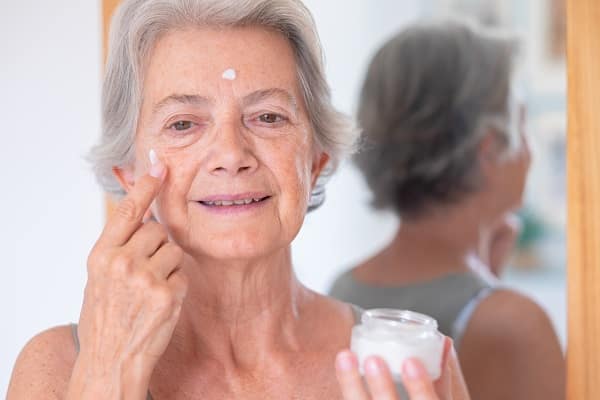Aging comes with many changes. One of the most drastic is typical to your skin. These changes can be due to various factors, including genetics, sun exposure, and lifestyle choices. In this post, you will learn about how aging affects your skin and what you can do to counteract these effects. It will also cover some of the most common skin problems associated with aging and provide tips for preventing them. So, whether you are just starting to experience signs of aging or have been dealing with them for a while, keep reading for information on maintaining healthy and beautiful skin!
Contents
Why Your Skin Changes As You Age

Your skin is your body’s largest organ, and it undergoes constant changes throughout your life. As you age, these changes become more visible and can result in several skin problems. The most common signs of aging skin are wrinkles, fine lines, dryness, thinning, and sagging. Most of these changes are due to decreased collagen and elastin production.
Collagen is a protein that helps keep your skin firm and elastic, while elastin allows your skin to stretch and return to its original shape. Unfortunately, your body produces less of these proteins with age, resulting in loose, saggy skin. Additionally, the loss of collagen and elastin can lead to the formation of wrinkles and fine lines. In the next section, you will learn more about the common signs of aging skin.
Common Ways Aging Affects Your Skin
While some of the changes listed above are inevitable, there are many things you can do to slow the aging process and keep your skin looking its best. Below are some of the most common ways that aging affects your skin and what you can do to prevent or treat them:
Wrinkles

As you age, your skin naturally becomes thinner and less elastic. This process is accelerated by exposure to ultraviolet (UV) light, which breaks down collagen and elastin fibers in the skin. The loss of these supportive structures causes the skin to form wrinkles. While there’s no way to stop the aging process completely, there are several things you can do to slow it down and prevent wrinkles from forming.
First, avoid prolonged exposure to sunlight or artificial UV light. Second, use a gentle cleanser and moisturizer daily to keep your skin hydrated and protected from external irritants. Finally, eat a healthy diet with plenty of fruits, vegetables, and healthy fats. These steps can help keep your skin looking young and wrinkle-free for years to come.
Dryness

One of the most noticeable changes your skin goes through as you age is a loss of moisture. This can cause your skin to become dry, flaky, and rough. A number of factors contribute to this loss of moisture, including decreased production of natural oils, diminished blood flow, and reduced levels of collagen and elastin. Fortunately, there are several ways to combat dryness and keep your skin looking its best.
Regular use of a moisturizer can help to replenish lost moisture and protect your skin from further damage. In addition, using products that contain ingredients like hyaluronic acid or glycerin can help to attract and retain moisture. Finally, drink plenty of water throughout the day to keep your skin hydrated from the inside out. By taking these simple steps, you can help to keep your skin looking its best as you age.
Thinning

The process of thinning skin is gradual and usually starts around the age of 40. The loss of collagen and elastin fibers makes skin less firm, and the fatty tissues below the skin begin to shrink. As a result, your skin becomes thinner and more fragile. This increased fragility can lead to problems such as wrinkles, bruises, and even ripped skin. Thinning skin can also make it more difficult for wounds to heal properly.
To prevent your skin from thinning, you can do a few things. Most importantly, always wear sunscreen and clothing that protect your skin from the sun’s harmful rays. It is also best to avoid smoking as it damages collagen fibers and decreases blood flow to the skin. And finally, Eat a diet rich in fruits and vegetables. Use products that contain retinoids or alpha-hydroxy acids, which can reverse cell damage and help with collagen production. By being mindful of these actions, you can help to keep your skin thick and healthy as you age.
Sagging

Sagging skin is one of the most visible effects of aging. As you have learned, your skin loses elasticity and becomes thinner as you age, making it less able to resist gravity. This can result in drooping eyelids, jowls, and a general loss of facial definition. While sagging skin is inevitable to some degree, there are several things you can do to help prevent it. The first step is to protect your skin from the sun. Ultraviolet rays can damage collagen and elastin, the fibers that give skin its structure.
Next, you should use a moisturizer every day to help keep your skin hydrated and supple. Choose one that contains hyaluronic acid or glycerin, which attracts water and helps plump the skin. Finally, consider using a retinoid cream or serum. Retinoids stimulate collagen production and help to thicken the skin. Used consistently, they can help reduce the appearance of wrinkles and sagging skin. With a little care and attention, you can help keep your skin looking youthful and radiant.
Development Of Lesions

The development of lesions is the final effect of aging this post will cover. Lesions are typically small, round, and flat and can be either red or white. They are often found on the face, chest, and back. While they are not dangerous, they can be a nuisance. Lesions are caused by a build-up of keratinocytes, cells producing keratin. Keratin is a protein that helps to keep the skin tough and resilient. However, the older you are, the less keratin your skin produces. As a result, the keratinocytes accumulate on the skin’s surface.
This can eventually lead to the formation of lesions. However, there are several things you can do to prevent the development of lesions. First, you can use a gentle exfoliating cleanser to help remove dead skin cells. Second, you can use a moisturizer to help keep your skin hydrated. Lastly, you can use sunscreen to help protect your skin from the sun’s harmful rays. By taking these steps, you can help prevent the development of lesions and keep your skin looking its best.
Understand How Aging Affects Your Skin!
Aging is a natural process that happens to everyone. Unfortunately, the aging process can take a toll on your skin. However, there are several things you can do to help prevent or reduce the effects of aging on your skin. The first step is to understand what causes these different effects; from there, you can take the necessary steps to help keep your skin looking its best. If you struggle to manage them, don’t hesitate to speak with a dermatologist!


